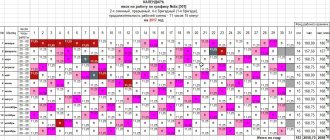Mandatory medical examination for office workers: Legal Regulations
According to the norms of Art. 213 of the Labor Code of the Russian Federation and clause 13.1 of SanPiN 2.2.2/2.4.1340-03, all employees who work in conditions that include factors harmful to human health must undergo regular medical examinations. The employer is obliged to send such employees for preventive examinations by doctors and not allow those who have not passed the medical examination to work. All costs for these activities are borne by the employer.
The list of harmful factors is also known - it was approved by order of the Ministry of Health and Social Development of Russia dated April 12, 2011 No. 302n (hereinafter referred to as order No. 302n). This list also includes such a phenomenon as “electromagnetic field of a broadband frequency spectrum from a PC.” Simply put, radiation from office equipment, primarily from computers.
At the same time, in the chain of the Labor Code of the Russian Federation - SanPiN - order of the Ministry of Health and Social Development, there is no direct connection between the need for medical examinations and the results of SOUT. That is, even if, according to the results of the SOUTH assessment, the workplace of an office worker is recognized, for example, as not containing factors hazardous to health, but there is a computer on it, on which the employee spends more than half of his working time, periodic medical examinations of such an employee are still necessary.
Subtleties of Organizing Medical Examinations of “Office Plankton”
Labor legislation stipulates that in order to protect public health and prevent the occurrence and spread of diseases, employees of trade enterprises are required to undergo preliminary and periodic preventive medical examinations. Does this standard apply to all employees of a trade organization? What is the procedure for recording expenses associated with medical examinations for profit tax purposes? Are employer payments for such inspections subject to personal income tax and insurance contributions?
Who needs a medical examination?
The rules for undergoing medical examinations for employees of trading enterprises are enshrined in the Labor Code of the Russian Federation, sanitary and epidemiological requirements and orders of the Ministry of Health and Social Development. According to Art. 213 of the Labor Code of the Russian Federation, employees in organizations of the food industry, public catering and trade are required to undergo: - preliminary medical examinations - upon hiring; - periodic medical examinations - during the period of work. On January 1, 2012, Order of the Ministry of Health and Social Development of Russia dated April 12, 2011 N 302n (hereinafter referred to as Order N 302n) came into force, which approved the Lists of harmful and (or) hazardous production factors and work, during the performance of which mandatory preliminary and periodic medical examinations (examinations) are carried out ). Based on clause 15 of Appendix No. 2 to the said document, medical examinations should be carried out in public catering organizations, trade, buffets, catering units, including in transport. Similar requirements are established in paragraph 1 of Art. 34 of the Law on the Sanitary and Epidemiological Welfare of the Population <1>. ——————————— <1> Federal Law of March 30, 1999 N 52-FZ “On the sanitary and epidemiological welfare of the population.”
In paragraph 1 of Art. 23 of the Law on Food Quality and Safety <2>, SP 2.3.6.1066-01 <3> states that workers engaged in work related to the production and circulation of food products and the provision of services in the retail trade of food products must undergo a medical examination , materials and products, during the execution of which direct contact of workers with food products is carried out. ——————————— <2> Federal Law of 01/02/2000 N 29-FZ “On the quality and safety of food products”. <3> SP 2.3.6.1066-01 “2.3.5. Trade enterprises. Sanitary and epidemiological requirements for trade organizations and the circulation of food raw materials and food products in them. Sanitary and epidemiological rules", approved. Resolution of the Chief State Sanitary Doctor of the Russian Federation dated 09/07/2001 N 23 “On the implementation of Sanitary Rules”.
This raises the question: is it necessary to conduct medical examinations for workers not involved in the food trade? When contacting Rospotrebnadzor authorities, trade organizations, as a rule, receive an answer that Order No. 302n does not establish requirements for preliminary and periodic medical examinations for employees of department store stores. A similar issue was considered by the Office of Rospotrebnadzor for the Leningrad Region (Letter dated March 12, 2012 N 47-01-01-883/12 “Current clarifications on the protection of consumer rights and sanitary and epidemiological welfare of the population,” issue 38). A jewelry store seller must have a medical record and undergo a medical examination once a year if he uses the same sanitary facilities with sellers of children's goods and food products. On this basis, we conclude that the obligation to undergo preliminary and periodic medical examinations is established at the legislative level only for workers involved in the circulation of food products. However, it is necessary to check whether regional regulations have introduced additional grounds for conducting medical examinations (in particular, such a right is established in paragraph 2 of Article 34 of the Law on the Sanitary and Epidemiological Welfare of the Population). For example, previously in Moscow there was a List of <4> categories of workers who are subject to mandatory medical examinations, and workers in the trade of industrial goods were included in it (lost force as of 02/18/2014). ——————————— <4> Appendix 1 to the Decree of the Moscow Government of December 28, 1999 N 1228 “On mandatory preventive medical examinations and hygienic certification.”
Periodic medical examinations should be carried out at least once a year. Workers must be examined by the following specialists: dermatovenerologist, otorhinolaryngologist, dentist, infectious disease specialist (on the recommendation of doctors participating in preliminary and periodic medical examinations). In addition, when undergoing a preliminary and periodic medical examination of all categories of subjects, a therapist, psychiatrist, and narcologist must be present (clause 15 of Appendix No. 2 to Order No. 302n). There is another interesting point. Since Order N 302n does not divide trade and public catering workers by profession and position, all personnel with access to food products must undergo annual periodic medical examinations. So, for example, if an office employee comes into contact with food only during inventory periods and this fact is recorded in the organization’s acts, in order to avoid conflicts with inspectors, care must be taken to send the employee for a medical examination. If an employee has undergone a medical examination and its results reveal that the work performed by the employee is contraindicated for him, he must be removed from work or transferred to another. If a transfer is required, but there is no suitable job in the organization, the employee can be fired (Articles 73, 76, clause 8, part 1, Article 77 of the Labor Code of the Russian Federation). Often, trading enterprises deliver goods to customers on their own and have drivers on staff. It must be remembered that this category of workers must undergo a pre-trip medical examination (clause 3 of Article 23 of the Law on Road Safety <5>). For the absence of pre-trip medical examinations of drivers, a traffic police inspector may fine the organization 30,000 rubles. (Part 2 of Article 12.31.1 of the Code of Administrative Offenses of the Russian Federation). The organization can also be punished by the labor inspectorate - held accountable under Art. 5.27 of the Code of Administrative Offenses of the Russian Federation for violation of labor and labor protection legislation. ——————————— <5> Federal Law of December 10, 1995 N 196-FZ “On Road Safety”.
Not a single trading enterprise can do without office employees: advertising department, accounting, logistics, etc. It should be remembered that employees whose work involves using a computer more than 50% of the working time must undergo mandatory preliminary and periodic (once every 2 years) medical examinations (by a neurologist and ophthalmologist) (clause 3.2.2.4 of Appendix No. 1 to Order No. 302n , Letter of the Ministry of Labor of Russia dated 04/08/2013 N 15-1-859). Let us note that on this issue there are court decisions not in favor of employers (Resolution of the FAS VSO dated November 22, 2012 N A19-5282/2012). Of course, you can try to circumvent the law and avoid medical examinations of all office workers whose workplaces are equipped with a computer. To do this, it is necessary to record the obligation of employees to use the computer less than half of the working time during the day. It is better to approve this rule in an order or job description. The rest of the work time should also be scheduled. This includes working with papers, participating in meetings, conferences, etc. However, this is not a guarantee that the company will not be held administratively liable for violating labor laws (Part 1, Article 5.27 of the Code of Administrative Offenses of the Russian Federation).
Guarantees for employees provided for by the Labor Code of the Russian Federation during medical examinations
During the medical examination, the employee retains his average earnings (Art.
https://youtu.be/ildiCxWxGng
Frequency of medical examinations for office workers
Office workers must be sent for medical examinations at least once every 2 years. If the team is very young and there are people under 21 years of age, then they should be examined annually.
The minimum set of specialists that an office employee must undergo is a therapist, an ophthalmologist and a neurologist.
Important! The medical institution where employees are sent must have a license to conduct medical examinations.
If the nearest suitable medical organization does not have a license or one of the required doctors, the employer has the right to send employees on a business trip to undergo a medical examination. Where there is everything you need.
If one of the employees does not have a medical examination on time, he should not be allowed to work until he has passed the mandatory examination.
Are there fines for failure to conduct medical examinations for office workers in 2020?
An employer who allows an employee to work who has not passed a mandatory medical examination may be held administratively liable under Art. 5.27.1 Code of Administrative Offenses of the Russian Federation:
- Individual entrepreneurs with employees will be fined from 15,000 to 25,000 rubles;
- employer-legal entity - from 110,000 to 130,000 rubles;
- employer officials responsible for permission to work - from 15,000 to 25,000 rubles.
For a repeated similar offense, the administrative punishment is toughened (Part 5 of Article 5.27.1 of the Code of Administrative Offenses of the Russian Federation):
- The individual entrepreneur will pay from 30,000 to 40,000 rubles, and he also faces suspension of activities for up to 90 days;
- the fine for a legal entity employer will be up to 200,000 rubles, and its work may also be suspended for up to 90 days;
- employer officials will have to fork out 30,000–40,000 rubles. or receive disqualification for a period of 1 to 3 years.
Important! The employer can go to court to cancel the fine. In this case, the responsibility to prove in court the existence of real harm to the employee’s health falls on those who inspected the employer and imposed fines (that is, on the Labor Inspectorate).
Is it possible to avoid fines if office workers do not undergo the required medical examination?
Rostrud officials themselves tried to answer this question. Here are their main recommendations:
- To finalize local acts related to the organization of employee activities:
- Specify in job descriptions a limited duration of time spent at the computer, and provide for mandatory technical breaks for employees. According to the instructions, the total time of contact with the computer during an 8-hour working day should not exceed 3.5 hours.
- Rewrite the list of employee responsibilities in the job description so that half of the responsibilities indicated in it are not related to being at the computer.
According to Rostrud, in this case the likelihood of fines will be minimal.
- Have a conclusion on the environmental safety standards, which will indicate that electromagnetic radiation in the workplace is within normal limits. There are judicial precedents where the presence of such a conclusion helped to cancel a fine imposed by the State Tax Inspectorate through the court.
In what cases can you not undergo a medical examination?
The inspection of employees directly depends on the results of checking working conditions, which is what the certifying organization does. She checks the compliance of actual conditions with those specified in the employment contract, job descriptions and internal personnel documentation. The fact is that many managers, in order to avoid the costs associated with a medical examination, make fictitious entries indicating that the staff member does not spend more than 4 hours a day at the monitor.
The certification commission also checks the level of harmful factors.
If during the certification it is confirmed that staff spend most of their time doing paperwork, traveling to meetings, and performing other duties that do not require a computer, commission representatives cancel mandatory medical examinations for companies.
If an employee does not agree with this decision, he can contact the labor inspectorate, which will organize an extraordinary inspection without notifying the organization.
Will medical examinations be canceled for office workers in 2020?
Yes, there are such plans. At the beginning of 2020, the Ministry of Labor began to develop a bill repealing some points of Order No. 302n. In particular, it is planned to remove such factors as “electromagnetic field from a PC” from it.
This innovation will relieve the employer of the obligation to conduct mandatory medical examinations for office employees in any case. The need to do this will only appear when a negative impact in the workplace is identified during the SOUT.
Initially, the Ministry of Labor announced the entry into force of the bill in August 2019. However, August has arrived and there is still no law.
We traced the fate of the project on the website of the draft laws of the Russian Federation and can please employers. The project is “alive”, has passed all the preliminary stages: discussion, finalization, assessment of regulatory impact - and should be sent to the Ministry of Justice in the near future.
It can be predicted that the expected changes that exempt office workers from the obligation to conduct regular medical examinations will nevertheless appear in 2020.
Although, based on the practice of enacting bills in Russia, most likely, amendments to Order No. 302n will come into force in 2020. You can find more complete information on the topic in ConsultantPlus. Full and free access to the system for 2 days.
Correct posture when working at the computer
Despite the fact that the most correct posture when working at a computer exists, it is not recommended to stay in it all the time. Periodically, you need to change your body position slightly to give some muscle groups a rest. For example, slightly change the position of the back of the chair, stretch your legs. Doctors also recommend stretching and stretching your hands from time to time.
To work safely with the mouse, use a special wrist rest, or better yet, use keyboard shortcuts instead of mouse clicks.
When you work with the keyboard, your wrists should not be at unnatural angles or in an uncomfortable position, resting on the sharp edge of the table. To avoid this, you can raise the back edge of the keyboard; the keyboard itself should be at a distance of 10–15 cm from the edge of the table. If you use a wrist rest, it should be soft and at least 4 cm wide. There are different options for “ergonomic” keyboards with special key layouts, you can also try them.
Of course, when working with a laptop, many of these requirements cannot be met, but you can use an additional keyboard and mouse. There is no need to place the laptop on your lap: your hands should have support.
Sitting in the correct posture can be difficult at first. In particular, due to the fact that some muscles are not adapted to such loads. Therefore, during training, do planks, low block rows, bridges and exercises for stretching the chest muscles more often. This will help you quickly get used to the correct position.









